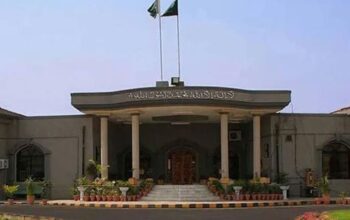By Staff Reporter
ISLAMABAD: Pakistan has posted the steepest decline in sovereign default risk worldwide over the past year, topping Bloomberg Intelligence’s Global Emerging Market Rankings for credit risk improvement, as growing investor confidence underscores the country’s economic turnaround.
Data from Bloomberg Intelligence showed Pakistan’s credit default swap-implied probability of default dropping from 59% to 47% over the past 12 months, an 11-percentage-point decline.
That marks the biggest reduction among tracked emerging markets, outpacing Argentina’s 7-point improvement, Tunisia’s 4-point drop, and Nigeria’s 5-point decrease. By contrast, sovereign risk has risen in nations like Turkiye, Ecuador, Egypt, and Gabon.
“This is a resounding signal to global investors: Pakistan is not only back on the map—it is moving forward with stability, credibility, and reform at its core,” Khurram Schehzad, adviser to Pakistan’s finance minister, said in a social media post.
Credit default swaps, insurance-like contracts traded by financial institutions, allow investors to hedge against the risk of a government defaulting on its debt. Bloomberg Intelligence uses CDS pricing to gauge sovereign risk in its widely followed Global EM Rankings. Pakistan’s steep decline in CDS-implied default risk reflects a significant shift in perception among global markets.
The improvement follows Pakistan’s brush with sovereign default in 2023, when dwindling foreign reserves and looming debt repayments pushed the nation to the brink. A short-term bailout from the International Monetary Fund, supported by allies like Saudi Arabia, the United Arab Emirates, and China, provided a lifeline. Since then, Islamabad has rolled out IMF-recommended structural reforms and fiscal adjustments to stabilize its economy.
“Pakistan stands out globally as the most improved economy in terms of reduction in sovereign default risk,” Schehzad said, attributing the progress to “macroeconomic stabilization, structural reforms, successful IMF engagement, and timely debt repayments.” “Pakistan is not only back on the global investment map—it is advancing with stability, credibility, and reforms at its core.”
He noted that credit rating agencies like Standard & Poor’s and Fitch have responded with improved outlooks, further boosting investor confidence.
Prime Minister Shehbaz Sharif welcomed the Bloomberg report, calling it a validation of his government’s efforts. “The report acknowledges important institutional reforms in various sectors, successful agreement with the International Monetary Fund, and timely loan repayments, which are definitely evidence of improvement in the government’s economic situation,” he said. “Pakistan is among the few countries that, according to Bloomberg, showed the most improvement in the economy in the last 12 months.”
Sharif added that the gains reflect “consistent hard work and dedication of the government’s economic team,” positioning Pakistan for “a strong economic future.”
Finance Minister Muhammad Aurangzeb provided a glimpse into the economic momentum, saying earlier this month that Pakistan’s economy likely grew 2.7% in the fiscal year ending June 2025, up from 2.5% the previous year.
The government had initially targeted 3.6% growth for the current fiscal year but revised that to 2.7% last month. The IMF projects 2.6% growth this year, rising to 3.6% next year, while Islamabad aims for 4.2% in the following fiscal year.
Copyright © 2021 Independent Pakistan | All rights reserved




